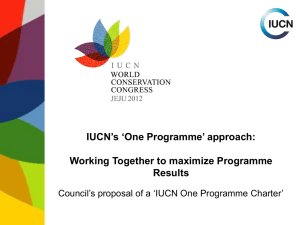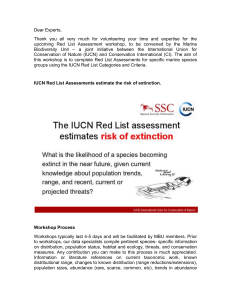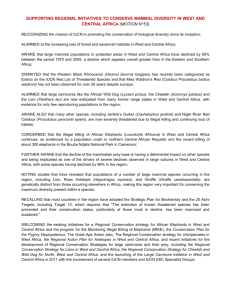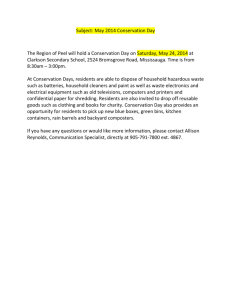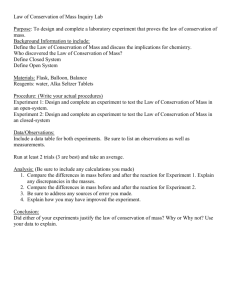Honouring Mandela`s Wish In 2003 when Former South African
advertisement
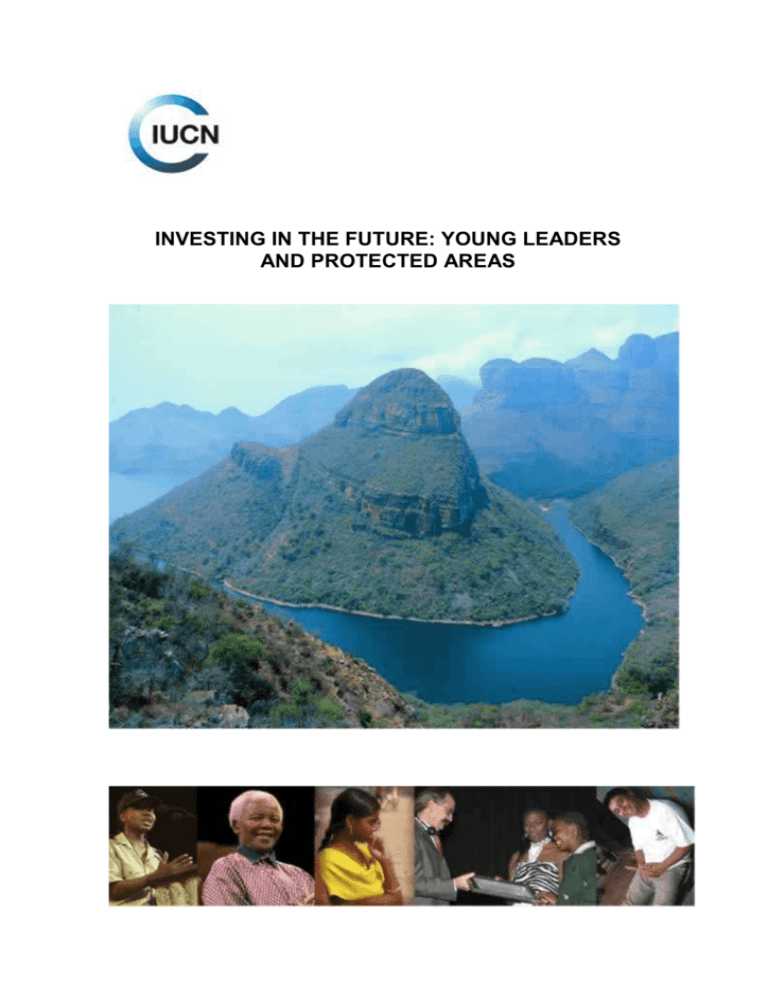
INVESTING IN THE FUTURE: YOUNG LEADERS AND PROTECTED AREAS Honouring Mandela’s Wish In 2003 when Former South African President Nelson Mandela addressed the Vth IUCN World Parks Congress, the primary global gathering of protected areas and nature conservation experts, he admonished delegates saying there were “too many grey hairs in the room”. His inspiring speech challenged us all to engage with young people, to build their capacities, channel their enthusiasm and inspiration into the global challenges of sustaining life on earth , safeguarding its most beautiful and inspiring places while respecting and building social equity. This document outlines how we hope to honour Mandela’s wish during the next great gathering of the world’s conservation community, the World Conservation Congress in Barcelona this October. IUCN IUCN, the International Union for the Conservation of Nature brings together nearly 1,100 State, government agencies, non-governmental organisations and affiliate members and some 10,000 scientists and experts from 181 countries. Together, these agencies and individuals exist in a unique partnership that leads the globe in meeting international sustainable development goals, ensuring biodiversity conservation, ecological integrity and promoting sustainable use for the benefit of current and future generations. The notion of Sustainability or the “ability to meet present needs without compromising future generations” lies at the very heart of IUCN’s mission. IUCN monitors global trends, emerging issues and status of the conservation agenda on a regular basis to fulfil this mission. It also mobilises its network towards action on critical areas of need and opportunity. Every four years, IUCN convenes the largest international gathering of conservation professionals to set this agenda and inform a plan of action as part of the World Conservation Congress (WCC). The WCC is divided into two major events, the World Conservation Forum, a platform for sharing, debating and capacity building around innovative ideas and solutions in conservation and sustainable development and the Business Assembly, or global environmental parliament, where member organisations decide on a detailed programme of work for the Union for the next four years. Unlike any other, the WCC offers an invaluable opportunity for delegates to engage thousands of peers and leading figures from governments, non-governmental organisations, business and the scientific community from around the world. This year, more than 8000 delegates are expected at the event in Barcelona from 5-14 October to discuss the growing challenges in conservation and sustainability. It will be the largest Congress yet and present one of IUCN’s most cutting edge programmes of work. It will also present an unparalleled opportunity for younger delegates to explore and contribute to the ideas, network and agenda that will shape the future of sustainability and their careers. Progress to date At the Parks Congress IUCN was not only challenged by Mandela but by international leaders, old and young alike, to prioritise enhanced capacity and engagement of youth and young conservation professionals in its work. One of these voices was issued by a youth ranger from the International Ranger Federation, who reminded us that young people would inherit the world we are shaping and have to cope “when you are all dead”. These calls were supported at the last World Conservation Congress in Bangkok (2004) where members issued a mandate to the Director General of IUCN ‘to establish a Young Professionals Programme within IUCN, coordinate opportunities for professional development, learning, leadership and mentorship that engages members and young professionals from developing countries’. Following on these calls, the World Commission on Protected Areas launched a series of initiatives aimed at enhancing young professional engagement within the work of the 2 16/02/2016 Commission and Programme on Protected Areas. These included a commitment to increase numbers of young professionals in the world’s single largest network of protected area professionals, the WCPA, from 4 to 10% (see text box) and two awards for excellence and training in protected areas management for young people. Together, these set the stage for the achievement of goals set out for IUCN and the WCPA while demonstrating a tangible commitment to involve and benefit from the knowledge and drive of young professionals. Barcelona will provide a forum for members, partners and experts to track IUCN progress on young professional engagement and capacity goals. Many of those concerned with promoting young people feel that despite progress, there is still a great deal more which can and should be done to encourage and engage young people both at these great meetings and in IUCN member countries, agencies and institutions. Given that young people by definition are often less senior and less able to access support and funding, one fundamental challenge remains resources to get young people together to share their experiences and build their expertise. Protected Areas: A Cool Vision by Hot Young Leaders One action we are planning in Barcelona is a workshop aimed at younger professionals with emerging careers and involvements in protected areas and conservation programs more broadly, to encourage the next generation of leaders in this crucial field. An Alliance Workshop at the IUCN World Conservation Congress The diversity of life on earth is protected in over 100,000 sites, or over 12% of the globe in Protected Areas. The extent of this protection has been lauded globally as a major win for conservation. However, there remain a number of challenges facing the continued expansion, planning and management of these areas. Capacity and resources are limited and many countries are lagging behind in the implementation of the Convention on Biological Diversity’s Program of Work on Protected Areas (POWPA). In order to ensure that protected areas are serving their intended purpose, it will be critical that the wealth of expertise and experience developed over the last 50 years is harnessed to respond to ongoing challenges. One critical aspect of this, recognised as a priority by the WCPA, is the need to transfer knowledge, experience and expertise between current protected area leaders, many of whom are on the brink of retirement, and future leaders. This transfer of institutional memory and a space for innovation and progression will provide the foundation for enhanced biodiversity conservation in the long-term. As part of this process, the WCPA and future leaders from the IUCN network will host an Alliance workshop to discuss emerging issues and needs in protected area management and conservation in the period ahead. The workshop will also draw on the results of a global survey of protected area professionals and inspire delegates with stories of how young leaders are making a difference in communities, management, research and policy in a rapidly changing world. Among those we would like to showcase: A young indigenous leader from Australia who is part of managing indigenous owned lands and seas not only for conservation outcomes in one of the world’s great remaining natural areas but to lift their communities out of extreme deprivation. A young community leader from Nepal with a background in social work and advocacy aimed at reducing the conflicts between communities and protected areas A conservation hero with distinction from Russia who has played a critical role in establishing capacity building and training networks in Eurasia An outstanding member of the United Nations Educational, Scientific and Cultural Organisation Youth Forum Experiences in protected area conservation will be shared and exceptional stories of leadership will be profiled. We also plan to work together with sister events aimed at leadership development and intergenerational capacity with a view to forming a consortium of organisations within the IUCN 3 16/02/2016 network who will work together to enhance the opportunities for younger people to contribute to global conservation. Our aspiration is that meeting delegates will come from a wide range of conservation professionals and decision-makers interested in the rejuvenation of protected area models, management and leadership. While the focus will be on providing a platform and opportunity for younger and developing country delegates, we are hoping to persuade the IUCN to deepen its commitment to achieving a culture which nurtures the next generation of conservation leaders. The main objectives of the workshop are: To generate support for a sustainable programme of professional engagement and development opportunities for future leaders within the IUCN family and WCPA in particular To enhance our understanding of challenges and opportunities facing protected areas and the roles being taken by young leaders To share the results of a global survey on protected area priorities The expected outputs/outcomes of the workshop: A summary of key action items arising from a global survey of protected area stakeholders and practitioners Feedback on the results of the survey and strategic themes in protected areas A clear message to IUCN, possibly through a statement to the plenary to support a rejuvenated and youth-defined initiative/programme of work for protected areas Recommendations to protected area authorities including IUCN’s WCPA and PPA Workshop Organisers WCPA Young Professionals Core Group comprising of representatives from the following organisations: World Commission on Protected Areas, IUCN Secretariat; Conservation International, Australian Parks Agencies Expected Participants Meeting delegates will come from a wide range of conservation professionals and decision-makers interested in the rejuvenation of protected area models, management and leadership. A great deal will depend on mobilising adequate resources to assist younger people to attend. While the focus will be on providing a platform for younger voices, these messages will be shared with current leaders and all those interested in innovation and the future of conservation. We feel strongly about honouring Mandela’s wish to see more young faces leading in the great challenges of conservation – will you invest in the future leaders? For more information please contact kristy.faccer@iucn.org and Penelope figgis figdon@ozemail.com.au 4 16/02/2016
